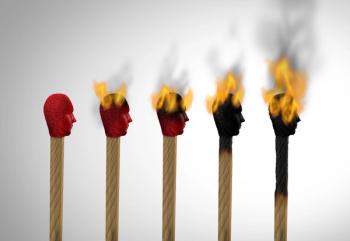
How we can defeat burnout
Burnout is not about broken doctors and nurses. It is about a broken system.
Editor’s Note: Physicians Practice’s blog features contributions from members of the medical community. These blogs are an opportunity for professionals to engage with readers about a topic that is top of mind, whether it is practice management, experiences with patients, the industry, medicine in general, or healthcare reform.
This past September, my organization sponsored a screening of Do No Harm, a documentary that profiles medical student and physician suicide. This issue is being increasingly discussed, and awareness is growing. The documentary showed how medical training can be dehumanizing and demoralizing. I have to admit that my first reaction was probably typical-I did it, so why can’t they? This is likely why we’ve allowed an unhealthy system to perpetuate itself for generations.
More recently, I read the excellent book Why We Sleep,which I found both intriguing and alarming. Intriguing because it taught me much I didn’t know about sleep and cognitive and physical functioning. Alarming because the medical profession not only tolerates but promotes sleep deprivation as a necessary element of training physicians make complex decisions or operate on patients with little to no sleep. The author profiled Dr. Halsted, the father of modern surgery, who himself would work for hours and hours without sleep. He was helped along in this state by his cocaine addiction, but he expected his residents to reside in the hospital in order to be constantly available to care for patients.
When I was on my obstetrics rotation as a family medicine resident, I remember falling asleep once on the desk at the nurse’s station. I would commonly work 110-hour weeks, and I just couldn’t stay awake that day. Do you know what I felt? Shame. I was ashamed that I wasn’t tough enough to work 100 plus hours week after week. After all, everyone else did it, right? No one was concerned that the physician who was responsible for the next newborn resuscitation or precipitous delivery was so exhausted. How can a system like this possibly produce healthy professionals who recognize limitations and support each other’s well-being?
Burnout is such a loaded word now. Being burned out can be a badge of honor and a shroud of shame. Medicine loves to push physicians to the brink of burnout. And we honor those seemingly superhuman individuals who are able to operate, diagnose, treat, and function without tending to their own basic needs of rest, nutrition, and social connection. It has been aptly stated that resiliency training is not the answer because physicians have already been trained to bounce back from crippling exhaustion, stress, and even depression. We are resilient.
Burnout is not about broken doctors and nurses. It is about a broken system.
Every practicing physician knows what is broken. We have ceded the practice of medicine to government, insurers, and health systems. I think we did this because we care about our patients and not about the business of medicine and government regulations. In order to focus on what is most important to us, we have ignored the looming threats to our ability to practice medicine with integrity.
Fortunately, things are changing, albeit slowly. Medical practice has become so burdensome and far from what we dreamed it would be that we, as physicians, are forced to turn our attention away from our patients and look internally into our profession and externally to the factors that threaten its integrity. I believe we are moving from the shame of not being able to tolerate a malevolent system and feeling outrage at what the system has created.
The challenge, of course, is that the system is us. I am a physician leader and have been an academic physician teaching students and residents the way I was taught. As Commodore Perry quipped over two hundred years ago, “we have met the enemy and he is us.”
This is not victim-blaming. Rather, it is a challenge to my smart, capable, and talented colleagues to take the passion and strength that made them physicians and fix this for the generations who will follow us. The fight is not against burnout; it is against the multitude of factors that drive us to burnout. The list is long and challenging-work hours and compensation, RVUs and quality metrics, the EHR, and tort law. But I believe we are capable of changing the system to promote not only healthy patients but healthy caregivers.
Jennifer Frank, MD, is a family physician and physician leader in Northeastern Wisconsin and finds medicine still to be the best gig out there. Married with four kids, she is engaged in intensive study and pursuit of work-life balance.
Newsletter
Optimize your practice with the Physicians Practice newsletter, offering management pearls, leadership tips, and business strategies tailored for practice administrators and physicians of any specialty.



